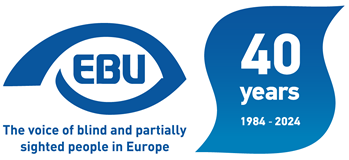In May 2018, in Vilnius, the Lithuanian Association of the Blind and Visually Handicapped (LASS) organized an information session on the UNCRPD. The session was based on the EBU publication "The UNCRPD – a new look at our human rights".
Initially, there were some doubts regarding the audience of the session. Though the recommendation from EBU office was to target blind and partially sighted persons not familiar at all with the UNCRPD, it turned out to be impossible to reach them. So, our choice fell on chairpersons of our organization‘s local branches who later could share the knowledge. Over 40 visually impaired persons participated in the event, a bit more than we expected and the fact came as a pleasant surprise.
From the very beginning it was planned to cover the following topics: habilitation and rehabilitation, education, work and employment and adequate standard of living and social protection. Two facilitators did their best to ensure that their presentations did not turn into lectures rather than a discussion with the participants. The most boring part (according to participants' comments) was the theoretical explanation of the Convention in the context of human rights. People were much more interested in very concrete steps and tangible support they might receive as visually disabled individuals. From our point of view it was a good decision to discuss the UNCRPD article on social protection. There were many questions related to benefits and support available for the blind to make life easier.
The session became even more interactive when the topic on employment was discussed. The topic has been quite hot in Lithuania for several months already. There are lots of discussion about social enterprises which are criticised by the European Disability Forum as being segregated workshops, though blind people strongly prefer to keep them as safe working places.
The purpose of the information session was to assist blind and partially sighted people in understanding what the UNCRPD means to them in their daily lives. It is difficult to say whether we have achieved the purpose one hundred percent. Maybe not, but at least in part.

